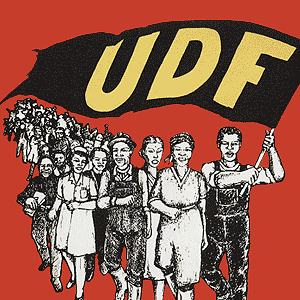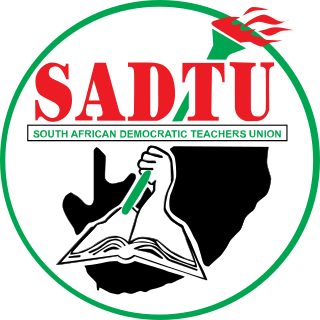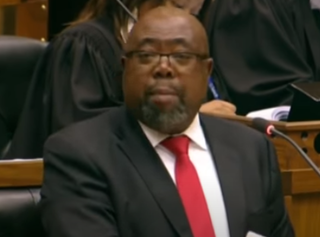Related Research Articles

The Congress of South African Trade Unions is a trade union federation in South Africa. It was founded in 1985 and is the largest of the country's three main trade union federations, with 21 affiliated trade unions.

The Zabalaza Anarchist Communist Front, formerly known as the Zabalaza Anarchist Communist Federation (ZabFed), is a platformist–especifista anarchist political organisation in South Africa, based primarily in Johannesburg. The word zabalaza means "struggle" or "active rebellion" in isiZulu, isiXhosa, siSwati and isiNdebele. Initially, as ZabFed, it was a federation of pre-existing collectives, mainly in Soweto and Johannesburg. It is now a unitary organisation based on individual applications for membership, describing itself as a "federation of individuals". Historically the majority of members have been people of colour. Initially the ZACF had sections in both South Africa and Swaziland. The two sections were split in 2007, but the Swazi group faltered in 2008. Currently the ZACF also recruits in Zimbabwe. Members have experienced oppression in South Africa and Swaziland.
Anarchism in South Africa dates to the 1880s, and played a major role in the labour and socialist movements from the turn of the twentieth century through to the 1920s. The early South African anarchist movement was strongly syndicalist. The ascendance of Marxism–Leninism following the Russian Revolution, along with state repression, resulted in most of the movement going over to the Comintern line, with the remainder consigned to irrelevance. There were slight traces of anarchist or revolutionary syndicalist influence in some of the independent left-wing groups which resisted the apartheid government from the 1970s onward, but anarchism and revolutionary syndicalism as a distinct movement only began re-emerging in South Africa in the early 1990s. It remains a minority current in South African politics.

The United Democratic Front (UDF) was a South African popular front that existed from 1983 to 1991. The UDF comprised more than 400 public organizations including trade unions, students' unions, women's and parachurch organizations. The UDF's goal was to establish a "non-racial, united South Africa in which segregation is abolished and in which society is freed from institutional and systematic racism." Its slogan was "UDF Unites, Apartheid Divides." The Front was established in 1983 to oppose the introduction of the Tricameral Parliament by the white-dominated National Party government, and dissolved in 1991 during the early stages of the transition to democracy.

The South African Democratic Teachers Union (SADTU) is the largest trade union for teachers in South Africa. It is allied to the African National Congress and is an affiliate of the Congress of South African Trade Unions (COSATU).
William Mothipa Madisha is a South African trade unionist and politician. Madisha is the former President of both the Congress of South African Trade Unions and the South African Democratic Teachers Union . Madisha grew up in Atteridgeville, Pretoria, South Africa, where he was a member of the United Democratic Front. He studied teaching at Transvaal College of Education.

The Federation of South African Trade Unions (FOSATU) was a trade union federation in South Africa.

The National Professional Teachers' Organisation of South Africa (NAPTOSA) is a professional organisation of teachers in South Africa. It is headquartered in Pretoria, South Africa.

Thembelani Waltermade "Thulas" Nxesi is a South African politician and former trade unionist who has been the Minister of Employment and Labour since May 2019. A representative of the African National Congress (ANC), he has been a member of cabinet since October 2011 and the Deputy National Chairperson of the South African Communist Party (SACP) since July 2012.
The South African Typographical Union (SATU) is a trade union representing workers in the printing and media industries in South Africa.
The Black Allied Workers' Union (BAWU) was a national trade union federation in South Africa.
The Council of Unions of South Africa (CUSA) was a national trade union federation in South Africa.
The Amalgamated Union of Building Trade Workers of South Africa (AUBTWSA) is a trade union representing workers in the construction industry in South Africa.
The Sweet Workers' Union (SWU) was a small but long-lived union representing confectionery workers in South Africa.
The South African Engine Drivers' and Firemen's Association (SAEDFA) was a trade union representing people involved in operating engines in South Africa.
The Professional Educators' Union (PEU) is a trade union representing education workers in South Africa.
The Suid-Afrikaanse Onderwysers Unie (SAOU), sometimes translated as the South African Teachers' Union, is a trade union representing principally Afrikaans-speaking teachers in South Africa.
Nonkqubela Ntomboxolo Pieters is a South African politician and educator who has been the Eastern Cape's Member of the Executive Council (MEC) for Rural Development and Agrarian Reform since 2021 and a member of the Eastern Cape Provincial Legislature since 2019, representing the African National Congress (ANC). She previously served as the MEC for Human Settlements from 2019 to 2021. Pieters served as the speaker of the Cacadu District Municipality from 2006 to 2018.
Nolitha Ntobongwana is a South African educator and politician. She currently serves as the chairperson of the Portfolio Committee on Public Works and Infrastructure in the National Assembly. A member of the African National Congress, she has been a Member of Parliament since 2019. Ntobongwana had previously served in the Eastern Cape Provincial Legislature.
Gail Denise Parker is a South African politician and public servant who represented the African National Congress (ANC) in the Northern Cape Provincial Legislature from 2014 to 2019. During that time, she served briefly as the Northern Cape's Member of the Executive Council (MEC) for Finance, Economic Development and Tourism from May to June 2017: she was appointed in a controversial cabinet reshuffle which the ANC later obliged Premier Sylvia Lucas to reverse. Parker trained as a teacher and entered politics through the South African Democratic Teachers Union.
References
- ↑ Kihn, Paul (1993). PLAYERS OR PAWNS?: "PROFESSIONALISM" AND TEACHER DISUNITY IN THE WESTERN CAPE, 1980-1990 (PDF). Cape Town: University of Cape Town. Retrieved 27 April 2021.
- 1 2 Kumalo, Vusi; Skosana, Dineo (2014). A History of the South African Democratic Teachers’ Union (SADTU) (PDF). SADTU. Retrieved 27 April 2021.
- ↑ Zengele, Vincent Thulani (2009). THE INVOLVEMENT OF TEACHER UNIONS IN THE IMPLEMENTATION OF THE EMPLOYMENT OF EDUCATORS’ ACT 76 OF 1998 (PDF). Pretoria: University of South Africa. Retrieved 27 April 2021.